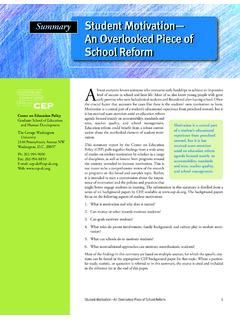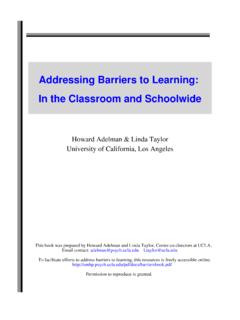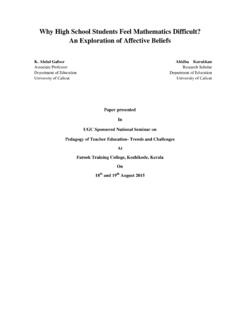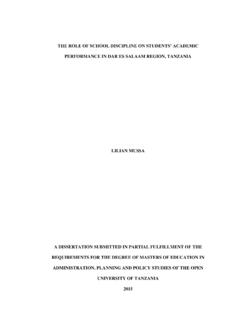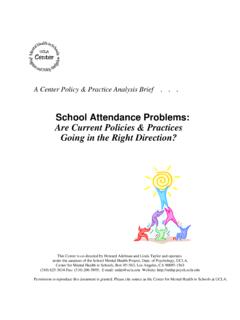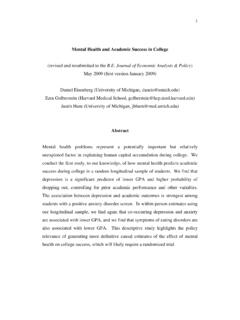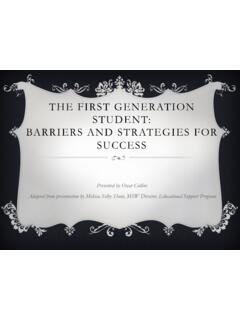Transcription of The Impact of Socio-economic Factors on the Performance …
1 Kamla-Raj 2014 J Hum Ecol, 45(3): 183-196 (2014). The Impact of Socio-economic Factors on the Performance of Selected high school Learners in the Western Cape Province, South Africa Amiena Bayat1, Wynand Louw2 and Ravinder Rena3. 1,3. Department of Economics, Faculty of economic and Management Sciences, 2. Institute for Social Development, University of the Western Cape, Private Bag X 17, Bellville, South Africa E-mail: 3. KEYWO RDS Economics of Edu cation. Educationa l Reform. National Senior Certificate Examinations. Underperforming Schools. Gender Equity, Poverty and Inequality ABSTRACT The quality education has been considered as a cornerstone of economic development and social transformation.
2 It is therefore, educational quality and its development have been regarded as indispensable for the teaching and learning process. The World economic Forum in April 2013 ranked South Africa as second from last in the world for math and science education, just ahead of Yemen. South Africa's schools fare poorly in international comparison, even among African countries. This research paper addresses some of the Socio-economic Factors that contribute for the underperformance of learners in secondary schools in the Western Cape province of South Africa. By definition, schools are categorised as underperforming if they do not obtain a pass rate of at least 60%.
3 In the National Senior Certificate Examinations. The underperforming schools are mainly located in the townships schools and schools in informal settlements with peculiar contexts. An attempt is made in this paper to delve the socioeconomic circumstances of learners' attending underperforming schools in the Western Cape Province and show that learners at these schools face a number of socioeconomic challenges which limits their ability to achieve. INTRODUCTION the poor receive a far inferior quality of educa- tion when compared to their wealthier counter- Concerns are expressed by many at the state parts (as quoted by Spaull 2011:1).
4 Of education in South Africa. These concerns It is therefore necessary to improve the have increased since the establishment of de- quality of education provided to the poor. mocracy in 1994 when the ANC was the domi- While it is easy to understand why the affluent nant party in the government of national unity. schools outnumber the affluent schools, outper- The ANC made a commitment in terms of hous- form poor schools, it is less clear why certain ing, education and health, these areas were tar- poor schools succeed where other, equally geted specifically to redress the legacy of apart- poor schools, fail.
5 Is this difference due to heid. variations in school management socio-econom- The strong legacy of apartheid and the ic status, and the provision of textbooks? consequent correlation between education Or perhaps differences in teacher quality, pa- and wealth have meant that, generally speak- rental education, and preschool education? ing, poorer students perform worse academi- While not without its own problems, quantita- cally. tive analysis is more able to identify these fac- Unfortunately little has changed for the last tors, and in addition, to the quantify the size of two decades of democracy.
6 It is to note that their Impact (Spaull 2011:1; Naidoo et al. 2014). the links between affluence and educational Further, the quality education is considered to be quality can partially explain this outcome since a corner stone of economic development and so- cial transformation. Educational quality and its Address for correspondence: development are therefore regarded as indispens- Prof Dr. Ravinder Rena Department of Economics, able for the teaching and learning process (Rena Faculty of economic and Management Sciences, 2008). It has become an established fact that University of the Western Cape, Private South Africa's schools fare poorly in interna- Bag X 17; Bellville, South Africa 7535 tional comparison, even among African coun- E-mail: tries.
7 Among 12 African countries participating in the Major Lindsey and Africa (MLA) study in 184 AMIENA BAYAT, WYNANDLOUW AND RAVINDER RENA. 1999, South African Grade 4 learners scored low- management or infrastructure. Gallie assessed est in numeracy and fourth lowest in literacy. (2007: 18) the quality of organizational capaci- The vast majority of children attending disad- ty available to perform effective change man- vantaged schools do not acquire a basic level of agement functions and classified schools into mastery in reading, writing and mathematics. In high -functioning, low-functioning, and non- its global rankings, the World economic Forum functioning institutions.
8 His study implies that (2013) recently ranked South Africa second last most schools in South Africa are either low or in the world for math and science education, non-functioning. In terms of schools' infrastruc- just ahead of Yemen. ture, the National Educational Infrastructure The government of South Africa has ac- Management Systems (NEIMS 2009) reported knowledged that the quality of school educa- that 3,600 public schools have no electricity, 2,444. tion for black people is poor across the coun- have no water supply, 11,231 use pit-latrine toi- try.
9 Van der Berg (2008: 2; cf. Bloch 2009) found lets, only 21% have a library, and 23% have a that educational quality in historically black computing facility. The Department of Basic schools - which constitute 80% of enrolment Education reported that 6,619 schools had multi- and are thus central to educational progress - grade classes in 2009 and 1,209 schools had an has not improved significantly since political average class size of over 60 in 2008 (Depart- transition. Educators, principals, school man- ment of Basic Education 2010). Unsurprisingly, agement teams and school governing bodies in the Institute for Justice and Reconciliation finds South Africa repeatedly stressed the view that that close to 80% of South Africa's schools are primary schools are continuously failing to lay a essentially dysfunctional (Taylor 2006: 65).
10 Solid educational foundation, especially with Low or non-functioning schools are suffer- regard to numeracy and literacy. Experts often ing from various Factors which include but not say that the government of South Africa has to limited to poor management and leadership within overcome years of underinvestment in black the school systems in the Western Cape. The education under Apartheid. With the aim of pro- Socio-economic backgrounds of the students moting learner achievement, the Government of and parents also contribute significantly to this South Africa embarked on many educational re- form changes.
